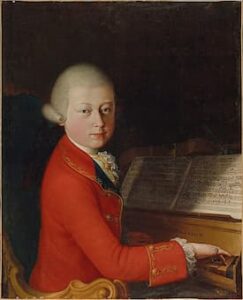
Mozart at the age of 13 in Verona, 1770
Musical tourism to Italy was in full swing by the middle of the 18th century. Italian cities and courts welcomed streams of musicians in search of performing opportunities, official appointments or commissions, and steady jobs. And that included the three child prodigies Thomas Linley, Wolfgang Amadeus Mozart, and Franz Lamotte.
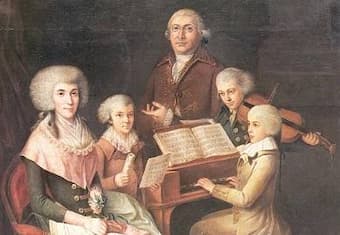
Mozart and Linley, 1770
Thomas Linley (1756-1778) was considered “one of the most precocious composers and performers that have been known in England.” He initially studied music with his father, and publically played a concerto at the age of 7. After further studies with William Boyce, Linley went to Italy and studied the violin with the composer and violinist Pietro Nardini in Florence. Linley spent three years in Florence, and in April 1770 he met up with his fellow musical prodigy Wolfgang Amadeus Mozart. Wolfgang and his father Leopold had been crisscrossing the Italian countryside in hopes of securing positions in the northern Italian Habsburg courts. A recommendation by Pallavicini gained them a meeting at the Palazzo Pitti with the Grand Duke and future emperor Leopold. They also met up with Nardini, and Nardini and Wolfgang performed together in a long evening concert at the Duke’s summer palace.
Wolfgang Amadeus Mozart: Symphony No. 10 in G major, K 74
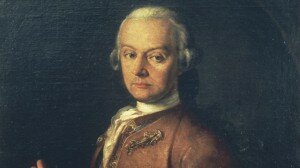
Leopold Mozart
Wolfgang met Thomas, and the boys got on famously. Leopold Mozart reports from Rome on 21 April 1770. “In Florence, we found a young English boy who is a student of the famous violinist Nardini. This youth, who plays beautifully, and who is Wolfgang’s size and age, came to the house of the erudite poetess Sgra Corilla … These two boys alternately produced the entire evening while constantly embracing each other… They played the entire afternoon alternately, not as boys, but as men! The little Tomaso accompanied us home and cried the most bitter tears because we were leaving the next day. But because he found out that we were not leaving until noon, he came the next morning at 9 a.m. and gave Wolfgang, accompanied by many embraces, the following poetry, which Sgra Corilla had made him the evening before, and he then accompanied our coach to the city gates. I wish that you had witnessed this scene.“ The musical journalist and musicologist Charles Burney would later write, “The Tommasino, as he is called, and the little Mozart, are talked of all over Italy, as the most promising geniuses of this age.”
Thomas Linley: Violin Concerto in F Major
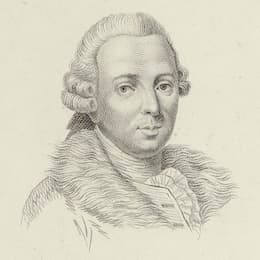
Pietro Nardini
At about the same time, yet another child prodigy was lurking around in Italy. His name was Franz Lamotte (1751-1780). Charles Burney reports that he was Flemish, “although his name appears to come from Walloon, the French-speaking part of the southern Netherlands.” Franz was sent to London at an early age to take violin lessons from Felice Giardini, and in local newspapers he was often referred to as “the young Englishman.” However, Lamotte really stepped into the limelight when he performed for Empress Maria Theresia at the Vienna Burgtheater on 29 December 1766 at the age of 15. The Empress was mightily impressed and provided the young violinist with a scholarship to embark on a lengthy concert tour. He performed in Prague and Leipzig in 1767, and in Padua and Venice one year later. Leopold Mozart tells us that Lamotte spent some time in Naples, and by 1770 he was concertmaster at the Vienna Hofkapelle. Lamotte continued to concertize in Paris and in London, and Wolfgang Amadeus Mozart would later call “his staccato unforgotten in Vienna.” In addition Mozart said, “Lamotte has the fingerboard fully under control.” Lamotte ran into some financial and criminal trouble and hurriedly left London about 1780. It has been reported that Lamotte drowned in a boating accident before reaching the age of 30.
Franz Lamotte: Violin Concerto No. 2 in D Major (Mirijam Contzen, violin; Bavarian Chamber Philharmonic Orchestra; Reinhard Goebel, cond.)
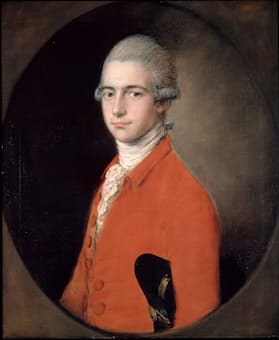
Thomas Gainsborough: Thomas Linley
If the story of Lamotte’s drowning is accurate, it sadly mirrors the fate of Thomas Linley. After his Italian adventures, Linley returned to England in 1771 and established himself as a leading figure in London’s musical life. By 1773 he had become leader of the Drury Lane orchestra, composing a substantial amount of music, including large-scale anthems, an oratorio and a good deal of incidental music. His “Shakespeare Ode” was considered “an extraordinary effort of genius in so young a man… From the general and sincere applause with which the Ode was received, we may venture to pronounce that if Mr. Linley, jun pursues his studies he will one day stand foremost in the list of modern composers.” While staying at Grimsthorpe Castle in Lincolnshire with his sister Mary, Thomas Linley drowned in a boating accident at the age of 22. The Morning Chronicle wrote, “This accident has deprived the profession to which he belonged of one of its principal ornaments, and society of a very accomplished and valuable member.”
Linley’s early death was immediately recognized as a tragedy for English music, and in a conversation with the singer Michael Kelly, Mozart supposedly remarked, “Linley was a true genius.”
For more of the best in classical music, sign up to our E-Newsletter
Thomas Linley: A Shakespeare Ode on the Witches and Fairies (Musicians of the Globe; Philip Pickett, cond.)




Thank you for all these fantastic things. I never heard any of these before. Except Mozart of course.